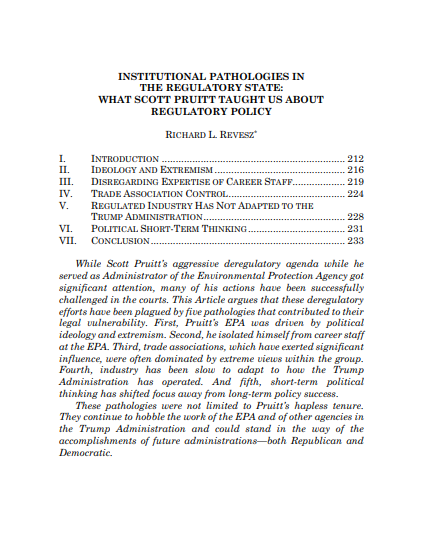-
Comments on New Jersey’s Energy Master Plan
New Jersey’s 2019 Energy Master Plan (EMP) outlines how the state can achieve its emissions reduction target of 80% below 2006 levels, as well as 100% clean energy, by 2050. We submitted comments applauding improvements to the draft EMP and making further suggestions. Our comments encourage the state to establish a technology-neutral policy framework to achieve its emissions reduction goal, compensate distributed energy resources in a way that reflects their full social value, and implement reforms to advance related technological and regulatory frameworks. We also submitted comments last October, during the EMP scoping phase, that made suggestions on grid resilience, rate design, and energy storage incentives.
-
Petition to NHTSA for Reconsideration of Fuel Economy Penalties
We filed a petition requesting that the National Highway Traffic Safety Administration (NHTSA) reconsider and rescind a new rule reducing penalties for automobile manufacturers that fail to meet corporate fuel economy standards. Our petition explains how NHTSA’s analysis ignores financial and environmental benefits forgone by the rule and relies on flawed, even contradictory evidence. NHTSA’s weakened fuel economy penalties deprive the public of substantial benefits and should be rescinded.
-
Comments to Minnesota on Electric Resource Planning and the Social Cost of Carbon
The Minnesota Pollution Control Agency and Minnesota Department of Commerce requested comments on their proposal to consider resource planning scenarios using a range of both environmental and regulatory costs. Minnesota has been a leader among states on incorporating environmental externalities into electricity policy, and our comments encourage the agencies to continue requiring the use of the social cost of carbon.
-
Institutional Pathologies in the Regulatory State
What Scott Pruitt Taught Us About Regulatory Policy
While Scott Pruitt’s aggressive deregulatory agenda while he served as Administrator of the Environmental Protection Agency got significant attention, many of his actions have been successfully challenged in the courts. This Article, published in the Journal of Land Use & Environmental Law, argues that these deregulatory efforts have been plagued by five pathologies that contributed to their legal vulnerability.
-
Comments to CEQ on NEPA and Greenhouse Gas Emissions
The Council on Environmental Quality is proposing to revise its National Environmental Policy Act guidance on the consideration of greenhouse gas emissions. We submitted comments explaining how the draft guidance makes vague and misleading statements with respect to when and how agencies must analyze the greenhouse gas emissions associated with their project approvals. We encourage CEQ to correct errors and align the guidance with federal caselaw and existing regulations.
-
Comments to DOE on Grid Resilience
The Department of Energy requested input on how it can enhance the resilience of electric infrastructure systems against severe weather events. We submitted comments, attaching our report on grid resilience and highlighting key takeways that may support DOE efforts to improve the power system.
-
Court Upholds 2015 Ozone Standards
A federal appeals court recently rejected industry and state challenges to a set of Obama-era air quality standards, which the Institute for Policy Integrity had filed an amicus brief defending. In 2015, the Environmental Protection Agency (EPA) strengthened National Ambient Air Quality Standards (NAAQS) for ground-level ozone, the primary ingredient in urban smog and the source of a variety of respiratory ills. The coal mining company Murray Energy Corporation, along with trade associations and several state attorneys general, brought suit in the U.S. Court of Appeals for the D.C. Circuit, arguing that the new standards were unnecessarily stringent and impossible to achieve. We filed an amicus brief in support of the standards.
-
Comments to DOE on Energy Conservation Standards for Air Conditioners
The Department of Energy requested input on impact and emissions analysis for upcoming energy conservation standards. We submitted comments encouraging DOE to continue to monetize the full climate benefits of greenhouse gas emissions reductions.
-
Comments on Connecticut’s Proposed Value Categories for Distributed Energy Resources
The Connecticut Department of Energy and Environmental Protection (DEEP) and Public Utilities Regulatory Authority (PURA) have proposed several quantitative and qualitative value categories it intends to examine in its study of the value of DERs. We submitted comments supporting their inclusion of avoided emissions costs, which covers both greenhouse gas emissions and ambient air pollutants, as a value category. We also encourage DEEP and PURA to include electricity system resilience among the quantifiable benefits of DER deployment.
-
Comments to DOE on Energy Conservation Standards for Metal Halide Lamps
The Department of Energy (DOE) recently asked for input on energy conservation standards for metal halide lamp fixtures. We submitted comments encourage DOE to continue monetizing the full climate benefits of greenhouse gas emissions reductions.






